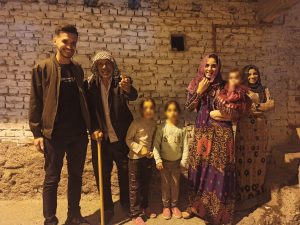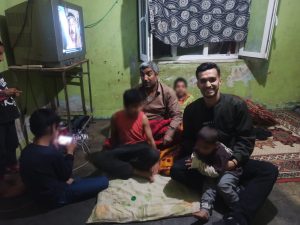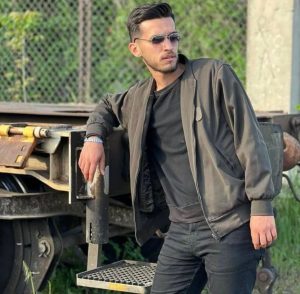Pre nego što sam došao ovde, pre rata, imali smo srećan i miran život sa mojom porodicom u Siriji. Sa početkom rata morali smo da napustimo našu zemlju. Jer grad u kojem smo bili je bio usred sukoba na svim stranama. Brzo smo krenuli na migracioni put, uzevši moju decu i moju porodicu. Koliko je teško ostaviti svoj dom, zavičaj i uspomene iza sebe, teško je i migrirati u neko drugo mesto i naviknuti se na život. Pre svega, migrirali smo u Šanliurfu, Turska. Pošto smo tamo boravili neko vreme u izbegličkom kampu, došli smo ovde na poziv naših rođaka koji su se ranije nastanili u Dijarbakiru. Živimo ovde od 2016. Život kao musliman nam daje osećaj udobnosti. Ljudi su nam mnogo pomogli jer vole da pomažu jedni drugima. Delimično nam pomaže i vlada. Srećan sam što sada živim ovde. Nemam više snage da migriram u drugu zemlju. Želim da živim ovde do kraja života. Neki članovi moje porodice su tražili azil u Nemačkoj ili drugim evropskim zemljama. Nisam fan odlaska. (slika 1)
Susret sa braćom izbeglicama bio je jedan od najtežih trenutaka u mom životu. Sasvim je drugačija situacija podeliti njihov bol, pokušati ih donekle razumeti i saosećati. Pokušavao sam da budem izuzetno oprezan kada sam im postavljao pitanja, jer nisam želeo da im ponovo krvarim iz rana. Kada sam ušao u kuću, jako me je zabolela glava od mirisa vlage. Ova situacija me je jako rastužila i mislio sam da ne možemo ništa da uradimo nego da pustimo ove ljude da žive u ovoj situaciji. Dok mi živimo u 4-sobnim kućama, u ovoj jednosobnoj kući sa polomljenim vratima, napuklim prozorima, napuklim zidovima živi 8 ljudi. Niko ko ne mora, ne mora da živi ovde. On ne želi da živi ovde. Deo koji me je najviše impresionirao tokom intervjua koji smo imali su sledeće reči Osmana, oca porodice; Posle rata postali smo izbeglice. Izgubili smo sve, izgubili smo dom, posao, rodbinu, zemlju u kojoj živimo. Izgubili smo otadžbinu. Ali jedno nismo izgubili, a to je osmeh na licu moje dece. Ako izgubimo osmeh, više nema smisla živeti. (slika 2)
Ovo je priča našeg učesnika iz Turske, Turan Azada, aktiviste i humaniste iz dalekog Diyarbakira, grada koji je blizu granice sa Sirijom. Azad ima 21 godinu i studira Engleski jezik na Univerzitetu u Musu, u Turskoj. Deo je organizacije Diyarbakır Çevre ve Kalkınma Derneği i pomaže ljudima u lokalnoj zajednici, takođe migrantima i izbeglicama. Na Omladinskoj razmeni je nesebično delio svoj znanje i iskustvo, svoje liderske sposobnosti je preneo na celu grupu, a veštine koje poseduje su svakako omogućile bolji kvalitet projekta.
Projekat “Re-framing narratives about people on move” je deo Erasmus+ programa, finansiran od strane Evropske komisije, a za implementaciju u Srbiji zadužena je Fondacija Tempus
.
.
Before I came here, before the war, we had a happy and quiet life with my family in Syria. With the start of the war, we had to leave our country behind. Because the city we were in was in the middle of the conflict on all sides. We started the migration journey quickly, taking my children and my family. As hard as it is to leave my home, homeland and memories behind, it is also difficult to migrate to another place and get used to living there. First of all, we migrated to Şanlıurfa, Türkiye. After staying there for a while in a refugee camp, we came here upon the invitation of our relatives who had settled in Diyarbakır before. We have been living here since 2016. Living here as a Muslim gives us a sense of comfort. People have helped us a lot because they like to help each other. The government also helps us partially. I am happy to live here now. I no longer have the strength to migrate to another country. I want to live here for the rest of my life. Some of my family have sought asylum in Germany or other European countries. I am not a fan of going. (photo 1)
Meeting my refugee brothers was one of the most difficult moments of my life. It is a very different situation to share their pain, try to understand them to some extent and empathize. I was trying to be extremely careful when asking them questions, because I didn’t want to bleed their wounds again. When I entered the house, the smell of dampness felt intensely caused me a headache. This situation made me very sad and I thought that we couldn’t do anything but let these people live in this situation. While we live in 4-room houses, 8 people live in this one-room house with a broken door, cracked windows, cracked walls. No one who does not have to, does not have to live here. He doesn’t want to live here. The part that impressed me the most during the interview we had was the following words of Osman, the father of the family; We became refugees after the war. We lost everything, we lost our home, our job, our relatives, the land we live in. We lost our homeland. But we haven’t lost one thing, and that is the smile on my children’s face. If we lose the smile, there is no point in living anymore. (photo 2)
This is the story of our participant from Turkey, Azad Turan, an activist and humanist from faraway Diyarbakir, a city close to the Syrian border. Azad is 21 years old and studies English at the University of Mus, Turkey. It is part of Diyarbakır Çevre ve Kalkınma Derneği and helps people in the local community, also migrants and refugees. At the Youth Exchange, he selflessly shared his knowledge and experience, he transferred his leadership to the entire group, and the skills he possesses certainly enabled a better quality of the project.
The project “Re-framing narratives about people on the move” is part of the Erasmus+ program, financed by the European Commission, and Tempus Fondation is in charge of implementation in Serbia.
Partner organisations:
Youth Roma Centre Association



